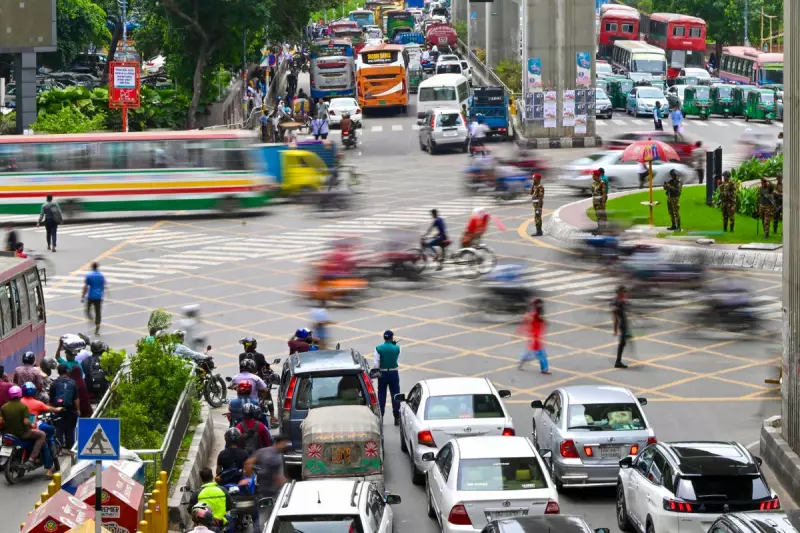
Nation Gripped by Fear as Security Forces Deploy
Bangladesh has been plunged into a state of high alert following a disturbing series of crude bombings and arson attacks that have rocked the capital Dhaka and several other cities this week. The South Asian nation, which is still recovering from a bloody revolution that ousted former prime minister Sheikh Hasina over a year ago, now faces fresh security challenges that have authorities scrambling to maintain order.
Wave of Coordinated Attacks
The violence began in earnest on Monday when at least 17 crude bombs were hurled at multiple locations across Dhaka. The first explosion occurred at approximately 3.45am local time near the headquarters of Grameen Bank, the microfinance organisation founded by Muhammad Yunus, who has served as interim leader since Ms Hasina's removal from power.
According to Dhaka police, a motorcyclist launched the attack on the Grameen Bank building before swiftly escaping the scene. Fortunately, no casualties were reported from this initial assault. Mr Yunus, who won the Nobel Peace Prize in 2006 for his pioneering work in providing micro loans to lift millions out of poverty, now finds his institution directly targeted in this latest wave of violence.
Within hours of the first attack, another incident saw two individuals on a motorbike throwing crude bombs at a business establishment owned by Farida Akhter, the government's Fisheries and Livestock adviser. The pattern of attacks continued into Tuesday night when a school was struck with a petrol bomb, adding to the growing sense of unease among citizens.
Religious Institutions Targeted
The tension escalated further when two bombs exploded on the premises of St Mary's Cathedral and St Joseph School, both institutions operated by the Catholic Church. This attack on religious establishments has particularly alarmed the international community and raised concerns about the potential for sectarian violence.
The educational sector has been significantly impacted, with several English-medium schools, many operated by convents, switching to online classes due to safety concerns according to reports from The Daily Star. Parents and staff alike are expressing anxiety about the security situation, with many questioning whether adequate protection can be guaranteed.
Police officials have suggested that the attacks on establishments associated with government advisers were deliberately timed to create public anxiety ahead of a "lockdown" declared by Ms Hasina's outlawed Awami League party on Thursday. "We have increased security everywhere," an official told The Independent. "These miscreants are trying to create tension again in Bangladesh."
Nationwide Security Response
In response to the escalating violence, security forces have been placed on high alert across Bangladesh. "Multiple units of our police forces are patrolling the important areas and we have increased surveillance across Dhaka," a police official stated. "We won't let these miscreants get away with arson and blasts. We have launched a citywide manhunt to arrest them. Our force is very active on the ground."
The attacks have not been limited to Dhaka. In the northern city of Mymensingh, tragedy struck when a driver sleeping inside a bus was killed after the vehicle was deliberately set on fire. Meanwhile, in Gazipur district, at least four other parked buses were torched between Tuesday night and early Wednesday morning.
Muhammad Hassan, a grocery shop owner in Gazipur city, expressed the fear gripping many ordinary citizens: "It is a never-ending nightmare in this country. We are scared to step out of our houses, but I run a shop, so how can we stay indoors in fear of a blast or attack."
Political Context and International Dimensions
The security situation has deteriorated since the Yunus administration set a seven-day deadline for political parties to reach consensus on conducting a national referendum concerning 84 reform proposals. Some of these proposals reportedly contradict the current constitution and relate to the implementation of the July Charter, which was developed with input from agitation leaders following Ms Hasina's ouster.
Significantly, the Awami League has been excluded from political dialogue since the interim government dissolved the party. Meanwhile, bombs were also thrown outside the International Crimes Tribunal's investigation agency office in Dhanmondi, adding another layer of complexity to the situation. The tribunal is expected to soon set a date for a ruling in the case against Ms Hasina, who faces charges of crimes against humanity for her alleged involvement in launching a brutal police crackdown on protesters during last year's monsoon season.
The United Nations estimates that up to 1,400 people were killed between July and August last year during the crackdown. Ms Hasina subsequently fled to India by helicopter after student protests evolved into a mass uprising against her 15-year authoritarian rule. She currently resides in Delhi, close to the corridors of power in the Indian capital.
Home affairs adviser Muhammad Jahangir Alam Chowdhury sought to reassure the public on Tuesday, stating that law enforcement agencies were prepared for the "Dhaka lockdown" called by the Awami League to protest against Ms Hasina's trial. "They will remain in a strong position to ensure normalcy," he said. "There is no cause for concern."
The army has been deployed across the nation for the past 15 months to support civil authorities, though last week approximately half of the 60,000 soldiers on policing duty were withdrawn to barracks for rest and retraining. Bangladesh is scheduled to hold its first national election since Ms Hasina's ouster in February 2026, though the current violence raises serious questions about whether the necessary security conditions can be established for a peaceful democratic process.





